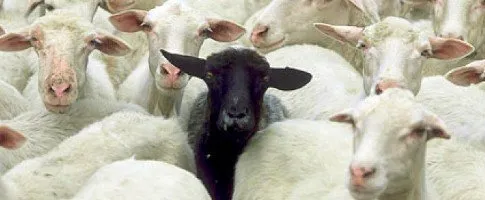
Every family has a black sheep. It is that somebody who has not followed the family custom, who does not partake the same attachments and affairs, above all, who dares to preserve their personality. Usually, others project their guilt on this black sheep to make him the "scapegoat" from a dilemma.
Obviously, being the black sheep is not a comforting impression, primarily because this phrase has somewhat but negative insights. By the moment we settled that what determines and satisfies others, does not represent us or satisfy us, they start to stare at us with anxiety because we have traversed a border that could not be passed.

Why are those that you love are frequently those who scrutinize you?
To explain why family and closest crowds make a black sheep, it is imperative to probe into the Social Identity Theory introduced by Henri Tajfel, a social psychologist of Polish ancestry. This data gives us some valuable suggestions to comprehend the event of discrimination within a group. In particular, we must recognize that despite their differences, all organizations and their constituents have remarkable points in common:
- The groups concentrate on the bad qualities of other groups. When groups make comments about other groups, usually these are negative because they try to manipulate the beliefs of its members, so that they believe that their group is superior. It is a mental bias in which most have fallen sometime. So we assume, for illustration, that our football team is the greatest or our family is the happiest, despite we know that is not exactly true at all.
- The group places huge stress on its members. Within the groups, there is a great level of demand on each of the members, a pressure that tries to control coherence and inner balance. Consequently, a parent can bestow leniency with the neighbor's children but very strict with their own.
Black Sheep Effect points exactly to this tension and critique exerted on the members of the group. In fact, it is the tendency of a group to evaluate one of its members more seriously, increasing their mistakes and employing more disciplines.
One of the outstanding studies in the archives of psychology, conducted in 1988, explains us obviously how this phenomenon transpires. These psychologists examined the typical environment of the group, one of the parts that concluded the attitude of people in the group to distinguish them from the rest and that is at the core of Black Sheep Effect.
In the research, they analyzed a group of students of philosophy with law students. The members of each group should learn a series of recorded speeches, some were very good and some very bad. Each session they're informing the participant if the speech was a student of law or philosophy. Psychologists also added a group of students who did not belong to any particular career and that they were not informed what career the person is studying who is giving the speech.

Such appreciation that when the students were to judge the speech of a member of his group (a person who studied the same class), pronounced more extreme awareness. In tradition, if a law student heard a bad speech of a student of the same course, it qualified as poor compared with the qualification that students of philosophy presented, and vice versa.
The same result is seen, for instance, in fans of a sports team. When your team plays badly, they are the first to protest and qualify the action as unfortunate, voicing more extreme unfavorable judgments. The same result appears within a family or group of friends.
In usual procedure, the group should ensure that its members not only hold together but also obey the rules that distinguish them and that certainly makes them "exceptional" than the rest. Consequently, any variation from the standard is a warning flag that merits correction.
Black Sheep Effect functions:
1. Maintain the positive character of the group, guaranteeing that its members meet the standards.
2. Demonstrate to the other members what happens when standards are not met.
3. Distract the attention of other group members from more serious problems that can extremely influence the group status.

Next to each black sheep masks the horror of a white sheep
The adjective "black sheep" actually hide a great anxiety.
- Fear of losing authority over one of the members. The family or group fears losing control over one of the members, whose role is essential to control balance, often dangerous.
-. Scared of damaging a confident character. The group is not solely the total of each of its members but has an individuality, which is displayed by its members. Each member wants, consciously or unconsciously, that your group has a conclusive uniqueness because that fills their self-esteem. So if one of its members appears not to satisfy the norms, it is regarded as a warning since the confident integrity that the group has created stumbles.
- Fear of leaving afloat additional enigmas. In many circumstances, specifying one of the group members as the black sheep suggests making them the scapegoat. In reality, the black sheep can be the authority that unitedly keeps the group since it deflects thoughts from other problems and much deeper pressures that can dispute the decisive integrity of the group in question.
- Fear induced by old wounds. In other instances, fear arises from reflection; ie people in the group perceive the black sheep love, practices, beliefs and ambitions that they had to restrain another time, to present the control of the group. See these acts are like reliving past trauma , which instinctively produces a defensive reaction.
In any circumstance, whatever the origin of the problem, you must be mindful that we are not born being black sheep. It's your social conditions that fit you as such when you do not satisfy certain criteria or hopes. Accordingly, responding to that mark is an act of bravery.

Belonging to a "horde" does not bring happiness: Dare to find your way
When a personality believes that he is the black sheep of the family, he can lean and quietly admit that role. In fact, many admit that label and play the role allotted to them by the group, which habitually means subjected to mockery, scorn and constant judgment inevitably.
Nonetheless, when you're classified like a black sheep, you also have another option: to respond. You do not have to admit a role in which all clean their hands and feel easy and the only hurt is you. It is not boarding on a personal campaign, simply to cite your liberty to be who you want to be and live the life you want.
There are times to be classified as the black sheep of the family can be the greatest thing that can occur. Examine yourself if you are part of that flock of white sheep will it certainly makes you glad. If not, perhaps it is time to consider an emotional distance . To achieve this distance you have to go despoiling various layers that have been formed around you throughout all these years. Basically, this release process consists of three steps:
1. Be conscious of your individuality. You do not have an obligation to be like your parents or siblings. You do not have to think like them or conform with their views or require the same things. You do not have to perform on their standards or do what others require you to do. You have the freedom to be yourself and pursue your dreams.
2. Feel satisfied with yourself. The black sheep usually consider they are evil, they do not merit honor or love, only because they are inconsistent. This word, by dint of repeating, may have sunk very deep within you, oddly since you have been advised by people who believably want the best for you. Hence, it is imperative that you feel great about being who you are, your preferences, ways of seeing time and choices. Be yourself and do not be embarrassed by it, on the opposite, be happy.
3. Accept others. When the black sheep eventually gets rid of the adverse impact of those around him and recognizes that there is nothing wicked in himself, he usually feels anger toward those who bound ??him to feel wrong for so several years. However, if you really require to take that mark out and bust free from the stress of that group, the least action is to pardon these people and admit them as they are.
Resources:
Marques, J. M. & Paez, D. (1994)
Marques, J. M. & Yzerbyt, V. Y. (1988)
Thanks for reading :)